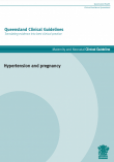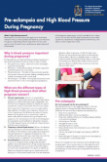A baby receives all its food and oxygen from the mother. This means that your heart has to work harder to send blood to the placenta and then to your baby.
The placenta usually has large blood vessels that make it easy for the food to get to your baby. Because these blood vessels are so big, your blood pressure normally drops during the middle third of your pregnancy and returns to normal by the end of the pregnancy.
If your blood pressure is too high during pregnancy, this may indicate that the blood vessels in the placenta have not developed normally. This is a risk to you and your baby, as it can be a sign of a serious complication known as pre-eclampsia.
When to get help
|
If you have any of the following symptoms contact your midwife or lead maternity carer (LMC) straight away. These could be warning signs of pre-eclampsia: |
|








